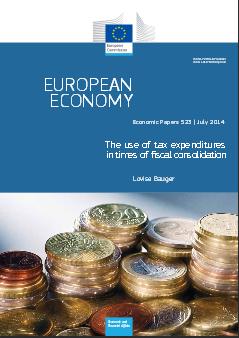Nahles, A. (2014) “European Social Policy For The Next Five Years“, Social Europe Journal, 21 Ιουλίου. For generations, Europe was a project of hope. To my parents’ generation, after a time of war and hostility, Europe represented the hope of achieving economic progress together in an atmosphere of peace and friendship. To my generation, Europe symbolised a place of hope and freedom following the Cold War. We criss-crossed fading …Read More
Juncker raises high expectations with ambitious agenda
Lannoo, K. (2014) “Juncker raises high expectations with ambitious agenda“, Politics and Institutions, CEPS Commentaries, 16 Ιουλίου. Based on his speech to the European Parliament on July 15th, following his election as President of the European Commission, Jean-Claude Juncker has clearly opted for ‘more Union’ during his five-year term, offering up an ambitious agenda that raises a host of expectations. In this CEPS Commentary, Karel Lannoo outlines the most …Read More
Book Review: The Europe Dilemma: Britain and the Drama of EU Integration by Roger Liddle
El Sehrawey, A. (2014) “Book Review: The Europe Dilemma: Britain and the Drama of EU Integration by Roger Liddle“, LSE EUROPP, 21 Ιουλίου. What is Britain’s future in Europe? What future should Britain want for the EU? Roger Liddle‘s book provides valuable commentary on a topic that is highly salient in Britain and could radically change the trajectory of the country on multiple levels, writes Amani El Sehrawey. The …Read More
Corporate governance of banks and financial stability
Laeven, L. & Ratnovski, L. (2014) “Corporate governance of banks and financial stability“, VoxEU Organisation, 21 Ιουλίου. Bank distress during the recent crisis caused significant damage to the real economy. Appropriately, the policy response focused on stronger bank supervision and regulation. This column asks if there is a role for improvements in bank corporate governance. Based on the literature the authors suggest that better risk management, regulation of pay, …Read More
The use of tax expenditures in times of fiscal consolidation
Bauger, L. (2014) “The use of tax expenditures in times of fiscal consolidation“, European Economy, Economic Papers 523, Ιούλιος. Against the background of recovering growth and remaining fiscal consolidation needs, reforming tax expenditures may offer a promising avenue to raise revenue and, at the same time, improve efficiency of the tax systems. The workshop, held by DG ECFIN on 23 October 2013, addressed the economic and budgetary aspects of …Read More
The European Council’s Guidelines for the Area of Freedom, Security and Justice 2020: Subverting the ‘Lisbonisation’ of Justice and Home Affairs?
Carrera, S. & Guild, E. (2014) “The European Council’s Guidelines for the Area of Freedom, Security and Justice 2020: Subverting the ‘Lisbonisation’ of Justice and Home Affairs?“, Justice and Home Affairs, CEPS Essays, 14 Ιουλίου. In its Conclusions of 26-27 June 2014, the European Council has adopted the new “Strategic Guidelines for Legislative and Operational Planning for the coming years within the EU’s Area of Freedom, Security and Justice …Read More
Why Juncker’s industrial goals are unlikely to be achieved
Wolff, Β. G. (2014) “Why Juncker’s industrial goals are unlikely to be achieved“, Bruegel Institute, 16 Ιουλίου. Instead of setting numerical goals, the new Commission president should focus on framework conditions, the single market and market failures ‘Industrial policy is back!’ This is the message given by the President Elect of the European Commission, Jean-Claude Juncker, at his confirmation by the European Parliament yesterday. In his speech, Juncker said …Read More
Trust and the welfare state: The twin-peaked curve
Algan, Y., Cahuc, P. & Sangnier, M. (2014) “Trust and the welfare state: The twin-peaked curve“, VoxEU Organisation, 17 Ιουλίου. It is commonly argued that the persistence of large welfare states in Scandinavian countries is due to the trustworthiness of their citizens. This column shows that the relationship between trust and the size of the welfare state is twin peaked. Untrustworthy individuals support generous welfare states because they expect …Read More
Did the German court do Europe a favour?
Mody, A. (2014) “Did the German court do Europe a favour?“, Bruegel Working Paper 2014/09, 15 Ιουλίου. The European Central Bank’s Outright Monetary Transactions (OMT) programme was a politically-pragmatic tool to diffuse the euro-area crisis. But it did not deal with the fundamental incompleteness of the European monetary union. As such, it blurred the boundary between monetary and fiscal policy. The fuzziness of this boundary helped in the short-term …Read More
The real lesson from the financial crisis is that we need to stop insulating financial regulation from democracy
Dorn, Ν. (2014) “The real lesson from the financial crisis is that we need to stop insulating financial regulation from democracy“, LSE EUROPP, 15 Ιουλίου. The financial crisis has generated a number of policies and discussions across Europe aimed at reforming financial regulation. Nicholas Dorn writes that while there is widespread recognition that a rethink is required to prevent a similar crisis from occurring again, the core problem underlying …Read More





